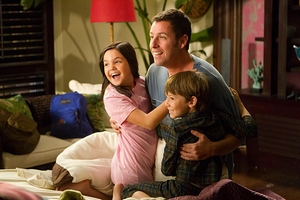Mark:
With a long history of childish comedy films behind him, one could be forgiven for having extremely low expectations when confronted with the latest offering from Adam Sandler and his Happy Madison crew. In Sandler’s long and successful career in film, however, there have been moments that have betrayed an underlying appreciation of family, and a strong tendency to prefer the warm and fuzzy happy ending rather than a much more modern realism. The best scenes in Big Daddy and 50 First Dates, for example, suggest a warmer side to what could be mistakenly taken for a man-child. So it is again with Just Go With It.
When Danny (Sandler) discovers his bride-to-be is a serial cheater, he calls off the wedding and heads to a bar to drown his sorrows. After discovering that his wedding band enables him to attract the amorous attentions of the beautiful women he once could have only dreamed of talking to, he begins a pattern of lying and one-night stands. The only woman with whom he has an ongoing relationship is his assistant Katherine (Jennifer Aniston), so who else would he turn to for help when another woman he wishes to woo needs face-to-face evidence that his (fake) marriage is really over?
The only woman with whom he has an ongoing relationship is his assistant Katherine (Jennifer Aniston), so who else would he turn to for help when another woman he wishes to woo needs face-to-face evidence that his (fake) marriage is really over?
Yes, the plot outline is trite, and there are many opportunities for the film to degenerate into an abysmal comedy along the lines of Hall Pass, one of the worst films in recent memory. And yet, Sandler somehow manages to skate a line that just averts the worst. This is mostly the result of his ability to retain the sympathy of an audience he easily could lose, and allow his supporting cast their moments to shine.
Chief recipient of his generosity is Aniston and, although she is given a straightforward task that could hardly challenge ‘America’s Sweetheart’, she is perfect for this role. Her interplay with Sandler is comfortable and believable, and they share a chemistry that might not have been predictable. Bailee Madison and Griffin Gluck are adequate as Katherine’s children and, again, their interactions with Sandler allow for occasional moments of heart. It is only Nick Swardson as Eddie who struggles with a role more typical of the Happy Madison oeuvre: his over-the-top theatrics are an unfortunate throwback to the worst of Sandler’s youthful excesses.
Nicole Kidman appears in a rather striking reminder of her talent in a supporting cameo that unfortunately was probably unnecessary and only serves to pad the film rather than enhance it. The film is overlong and could have benefited from a harsher edit, but audiences will still be left with the warm glow that comes from seeing two people – who are clearly meant to be together – get together.
Rating: